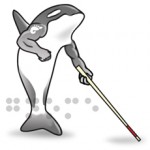Introduction:
- We're a little light on content, but we'll make up for it with enthusiasm!
Announcements:
- Ronny, K4RJJ, will be the LHS ambassador at the Dalton Hamfest, February 25, 2012, in Dalton, GA. Stop by and say hello.
Topics:
- Linux Mint 12 Review
- Richard has been using Ubuntu for some time, but he's been unhappy with the latest version. He's rediscovered Linux Mint! Version 12 is out, with Gnome 3, Gnome 2, MATE, and Cinnamon, and he gives a brief review.
- His primary needs: browser, email, Audacity, XChat, and a few others.
- Using the Gnome 3 desktop, as a desktop fills with icons, a new desktop is automatically created.
- By moving the mouse to a hot corner, you'll see a high-level view of all your open applications.
- Russ has been using Linux Mint Debian Edition, so he's missing out on the Gnome 3 goodies, at least for now.
- Our hosts then drift into a discussion of various desktop managers and visual effects.
- WINE: Wine Is Not an Emulator
- WINE is a collection of libraries for Linux that support Windows library calls from a Windows application.
- EchoLink, for example, is a Windows application works quite well under WINE on Linux.
- If you can't find a native Linux application that does what you want, you may find that WINE will allow you to run the Windows program.
- There are a couple of different versions of WINE, all based on the core version of WINE.
- Cedega: a version of WINE that supports a variety of Windows games.
- CrossOver: a version of WINE that originally focused on supporting business applications such as Internet Explorer and MS Office, but has also expanded to include some games and running Windows applications on a Mac.
- Richard browses the list of ham radio applications in the WINE application database.
- Russ talks about installation and configuration:
- Red Hat/Fedora: yum install wine
- Debian-based: apt-get install wine
- Some repositories may not have the most recent version of WINE (1.4 at the time of recording).
- Under System Tools (in Linux Mint, or Debian) there is a WINE Configuration tool.
- To install a Windows program under WINE, download the Windows installer application. At the command line, type "wine [name of installer executable]", and the setup program should proceed just as with Windows. A program icon should appear under the WINE program folder, and the program will, hopefully, run just like in Windows.
- Some Windows programs will run just fine under WINE; others won't. Give your favorite a try and see!
- One of the most-wanted ham radio applications, Ham Radio Deluxe v. 5.0, does not run at all under WINE. If you can find a copy of HRD v. 4, it should work under WINE. Remember, too, the native Linux application fldigi does much of what HRD would do.
- Russ has also tried the N1MM Logger under WINE, and it worked fine.
- The Winetricks tool might help get a Windows application running under WINE.
- The WineHQ forum is a good resource for help.
Feedback:
- We had a donation from William A. Thank you!
- Leif, KC8RWR, continues a comment dialog about the origin of CUPS in Episode 67.
- G8FXM, mentioned LHS in his blog. Thanks, David.
- The Hoosier Hills Ham Club linked to the LHS site and we linked back. Thanks to W.W., KB9TMP.
Contact Info:
- Contact Richard at kb5jbv@gmail.com, Russ at k5tux@lhspodcast.info, or both at the same time at info@lhspodcast.info.
- Listen to the live stream every other Tuesday at 8:00pm Central time. Check the LHS web site for dates.
- Leave us a voice mail at 1-909-LHS-SHOW (1-909-547-7469), or record an introduction to the podcast.
- Sign up for the LHS mailing list.
- Sign up for the MAGNetcon mailing list.
- LHS merchandise is available at the Merch link on Web site. Check out the Badgerwear or buy one of the other LHS-branded items at PrintFection.com/lhs or Cafe Press. Thanks!
- Thanks to Dave from Gamma Leonis for the theme music.
Music:
- To be added.

